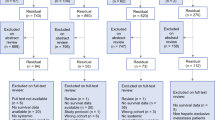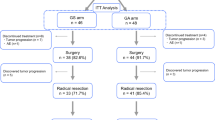Abstract
Background
For patients with metastatic pancreatic cancer, FOLFIRINOX (fluorouracil [5-FU], leucovorin [LV], irinotecan [IRI], and oxaliplatin) has shown improved survival rates compared with gemcitabine but with significant toxicity, particularly in patients with a high tumor burden. Because of reported response rates exceeding 30 %, the authors began to use a modified (m) FOLFIRINOX regimen for patients with advanced nonmetastatic disease aimed at downstaging for resection. This report describes their experience with mFOLFIRINOX and aggressive surgical resection.
Methods
Between January 2011 and August of 2013, 43 patients with borderline resectable pancreatic cancer (BRPC, n = 18) or locally advanced pancreatic cancer (LAPC, n = 25) were treated with mFOLFIRINOX (no bolus 5-FU, no LV, and decreased IRI). Radiation was used based on response and intended surgery. Charts were retrospectively reviewed to assess response, toxicities, and extent of resection when possible.
Results
The most common grade 3/4 toxicity was diarrhea in six patients (14 %) with no grade 3/4 neutropenia or thrombocytopenia. Resection was attempted in 31 cases (72 %) and accomplished in 22 cases (51.1 %) including 11 of 25 LAPC cases (44 %). Vascular resection was required in 4 cases (18 %), with R0 resection in 86.4 % of the resections. Complications occurred in 6 cases (27 %), with no perioperative deaths. The median progression-free survival period was 18 months if the resection was achieved compared with 8 months if no resection was performed (p < 0.001).
Conclusion
Neoadjuvant mFOLFIRINOX is an effective, well-tolerated regimen for patients with advanced nonmetastatic pancreatic cancer. When mFOLFIRINOX is coupled with aggressive surgery, high resection rates are possible even when the initial imaging shows locally advanced disease. Although data are still maturing, resection appears to offer at least a progression-free survival advantage.



Similar content being viewed by others
References
Seigel R, Naishadham D, Jemal A. Cancer statistics. CA Cancer J Clin. 2012;62:10–29.
Poplin E, Feng Y, Berlin J, Rothenber ML, et al. Phase III, randomized study of gemcitabine and oxaliplatin versus gemcitabine (fixed-dose rate infusion) compared with gemcitabine (30-min infusion) in patients with pancreatic carcinoma E6201: a trial of the Eastern Cooperative Oncology Group. J Clin Oncol. 2009;27:3778–85.
Ko AH, Quivey JM, Venook AP, Bergsland EK, Dito E, Schillinger B, Tempero MA. A phase II study of fixed-dose rate gemcitabine plus low-dose cisplatin followed by consolidative chemoradiation for locally advanced pancreatic cancer. Int J Radiat Oncol Biol Phys. 2007;68:809–16.
Mukherjee S, Hurt C, Griffith G, et al. SCALOP: Results of a randomized phase II study of induction chemotherapy followed by gemcitabine (G) or capecitabine (Cap) based chemoradiation (CRT) in locally advanced pancreatic cancer (LANPC). J Clin Oncol. 2012;30(Suppl 34). Abstract LBA146.
Smeenk HG, Incrocci L, Kazemier G, et al. Adjuvant 5-FU-based chemoradiotheray for patients undergoing R1/R2 resections for pancreatic cancer. Dig Surg. 2005;22:321–8.
Westerdahl J, Andren-Sandberg A, Ihse I. Recurrence of exocrine pancreatic cancer: local or hepatic? Hepatogastroenterology. 1993;40:382–7.
Kleef J, Reiser C, Hinz U, et al. Surgery for recurrent pancreatic ductal adenocarcinoma. Ann Surg. 2007:245;566–72.
Oettle H, Post S, Neuhaus P, et al. Adjuvant chemotherapy with gemcitabine versus observation in patients undergoing curative-intent resection of pancreatic cancer: a randomized controlled trial. JAMA. 2007;297:267–77.
Konstantinidis IT, Warshaw AL, Allen JN, et al. Pancreatic ductal adenocarcinoma: is there a survival difference for R1 resctions versus locally advanced unresectable tumors? What is a “true” R0 resection? Ann Surg. 2013;257:731–6.
Conroy T, Desseigne F, Ychou M, et al. FOLFIRINOX versus gemcitabine for metastatic pancreatic cancer. N Engl J Med. 2011;364:1817–25.
Callery MP, Chang KJ, Fishman EK, Talamonit MS, William Traverso L, Linehan DC. Pretreatment assessment of resectable and borderline resectable pancreatic cancer: expert consensus statement. Ann Surg Oncol. 2009;16:1727–33.
Murphy JD, Adusumilli S, Griffith KA, Ray ME, Zalupski MM, Lawrence TS, Ben-Josef E. Full-dose gemcitabine and concurrent radiotherapy for unresectable pancreatic cancer. Int J Radiat Oncol Biol Phys. 2007;68:3:801–8.
Kim EJ, Ben-Josef E, Herman JM, Bekaii-Saab T, Dawson LA, Griffith KA, Francis IR, Greenson JK, Simeone DM, Lawrence TS, Laheru D, Wolfgan CL, Williams T, Bloomston M, Moore MJ, Wei A, Zalupski MM. A multi-institutional phase 2 study of neoadjuvant gemcitabine and oxaliplain with radiation therapy in patients with pancreatic cancer. Cancer. 2013. Presented in part at the American Society of Clinical Oncology Gastrointestinal Cancers Symposium, 20–21 January, 2011, San Francisco, CA, USA.
Gillen S, Schuster T, Meyer zum Buschenfelde C, Friess H, Kleeff J. Preoperative/neoadjuvant therapy in pancreatic cancer: a systematic review and meta-analysis of response and resection percentages. PLoS Med. 2010;7:e1000267.
Hosein PJ, Macintyre J, Kawamura C. A retrospective study of neoadjuvant FOLFIRINOX in unresectable or borderline-resectable locally advanced pancreatic adenocarcinoma. BMC Cancer. 2012;12:199. doi:10.1186/1471-2407-12-199.
Faris JE, Blaszkowsky LS, McDermott S, Guimaraes AR, et al. FOLFIRINOX in locally advanced pancreatic cancer: the Massachusetts General Hospital Cancer Center experience. Oncologist. 2013;18:543–8.
Moureau-Zabotto L, Phelip J-M, Afchain P, Mineur L, et al. Concomitant administration of weekly oxaliplatin, fluorouracil continuous infusion, and radiotherapy after 2 months of gemcitabine and oxaliplatin induction in patients with locally advanced pancreatic cancer: a groupe coordinateur multidisciplinaire en oncologie phase II study. J Clin Oncol. 2008;26:1080–5.
Author information
Authors and Affiliations
Corresponding authors
Additional information
Mark Bloomston and Tanios Bekaii-Saab have contributed equally to this work and are co-corresponding authors.
Appendix
Appendix
See Appendix Fig. 3.
Rights and permissions
About this article
Cite this article
Blazer, M., Wu, C., Goldberg, R.M. et al. Neoadjuvant Modified (m) FOLFIRINOX for Locally Advanced Unresectable (LAPC) and Borderline Resectable (BRPC) Adenocarcinoma of the Pancreas. Ann Surg Oncol 22, 1153–1159 (2015). https://doi.org/10.1245/s10434-014-4225-1
Received:
Published:
Issue Date:
DOI: https://doi.org/10.1245/s10434-014-4225-1




